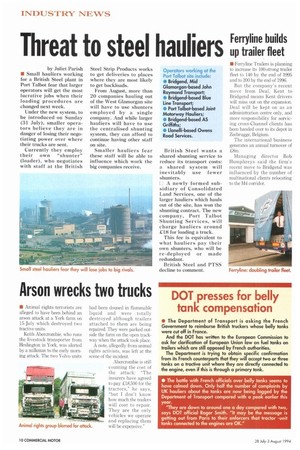Th reat to steel hauliers uFeprtrryaliinieerbfuleiledts by Juliet Parish • Small
Page 12

If you've noticed an error in this article please click here to report it so we can fix it.
hauliers working for a British Steel plant in Port Talbot fear that larger operators will get the most lucrative jobs when their loading procedures are changed next week.
Under the new system, to be introduced on Sunday (31 July), smaller operators believe they are in danger of losing their negotiating power over where their trucks are sent.
Currently they employ their own "shunter" (loader), who negotiates with staff at the British Steel Strip Products works to get deliveries to places where they are most likely to get backloads.
From August, more than 20 companies hauling out of the West Glamorgan site will have to use shunters employed by a single company. And while larger hauliers will have to use the centralised shunting system, they can afford to continue having other staff on site.
Smaller hauliers fear these staff will be able to influence which work the big companies receive. British Steel wants a shared shunting service to reduce its transport costs: a shared system will inevitably use fewer shunters.
I! A newly formed subsidiary of Consolidated Land Services, one of the larger hauliers which hauls out of the site, has won the shunting contract. The new company, Port Talbot Shunting Services, will charge hauliers around £18 for loading a truck.
This fee is equivalent to what hauliers pay their own shunters, who will be re-deployed or made redundant.
British Steel and PTSS decline to comment. • Ferryline Trailers is planning to increase its 100-strong trailer fleet to 140 by the end of 1995 and to 200 by the end of 1996.
But the company's recent move from Deal, Kent to Bridgend means Kent drivers will miss out on the expansion. Deal will be kept on as an administration centre only, and more responsibility for servicing cross-Channel clients has been handed over to its depot in Zeebrugge, Belgium.
The international business generates an annual turnover of Managing director Bob Humphreys said the firm's recent move to Bridgend was influenced by the number of multinational clients relocating to the M4 corridor.




































































































